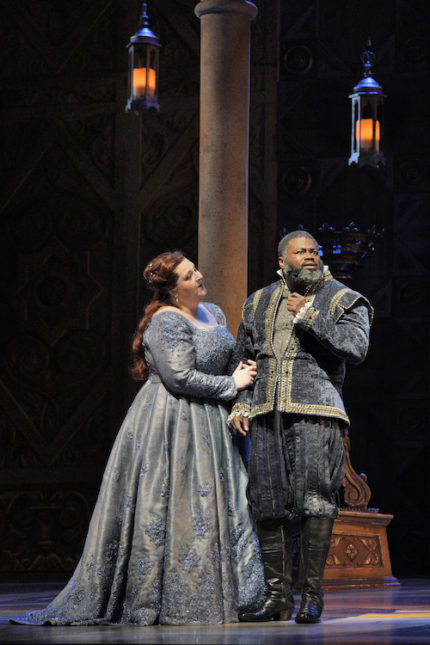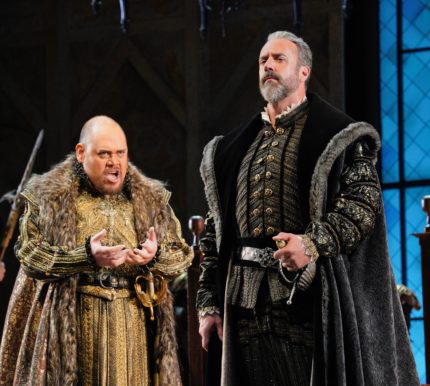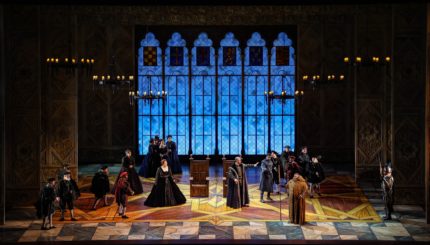An outstanding cast rides over the rough edges of “Ernani” to open Lyric Opera season

It was a singular bit of serendipity that within 48 hours of a new King Charles III ascending to the throne in Great Britain, a King Charles V became Holy Roman Emperor on the stage of the Civic Opera House.
The vehicle for the latter event was Verdi’s Ernani, which opened the Lyric Opera season—weeks earlier than usual—on Friday night.
Based on a Victor Hugo drama, Ernani premiered in Venice in 1844 and went on to earn great success throughout Italy. Verdi’s fifth opera was the first to gain him international fame, with Ernani performed in London a year after its debut, followed by Paris and New York.
Along with Nabucco, Ernani is the earliest Verdi opera to maintain a place in the regular repertoire. Still, it has not been performed by Lyric in 13 years, and it’s not hard to understand why.
The tale, set in 16th-century Spain, concerns the nobleman Ernani who has become an outlaw after his father’s murder and engages his gang of brigands in a—rather hapless—effort to rescue his beloved Elvira from her aged guardian Don Silva. Silva meanwhile has his own non-platonic designs on Elvira, as does Carlo, the King of Spain.
There are dramatic absurdities in most early Verdi operas, but Ernani at times becomes wholly preposterous even by genre standards. In the muddled libretto, motivations, alliances and villains change not only from act to act but often within scenes, with threats made and knives and swords brandished about every five minutes. When a key plot device has the decidedly unheroic title hero agreeing to commit suicide at the sound of a horn, something is seriously wrong in Aragon.
What makes Ernani continue to be worth hearing is the top-drawer music, with Verdi serving up soaring arias for each of the four principals, rousing choruses and ensembles and a multitude of duets and trios.
The composer’s music was largely well served in Friday’s opening performance, with an outstanding cast and evocative production launching the company’s 68th season on a high note.
Russell Thomas has become Lyric’s favored Verdi tenor in recent seasons. On opening night he brought his dark-hued vocal timbre and strenuous vocalism to the table, singing with power if not always subtlety. The singer’s acting was largely rudimentary but, in fairness, there is not much anyone can do with a reactive character who for much of the time seems like a mere plot device. Thomas’s performance grew in depth and nuance as the evening unfolded and he sang movingly in Ernani’s final moments.
Having Tamara Wilson as Elvira was wealthy casting indeed, even if there was little romantic chemistry between her Elvira and Thomas’s Ernani. The soprano’s instrument seem to have lost a bit of its richness and tonal luster but Wilson sang with great sensitivity and feeling in her opportunities. The put-upon Elvira is a rather thankless role as well, but Wilson acted as believably as the rickety libretto allowed.

Among the principals, it was really the two lower-voiced singers who provided the best all-around blend of vocalism and characterization Friday night.
Quinn Kelsey’s acting has become sharper and his baritone warmer and deeper with the passing seasons. As Don Carlo, the Lyric regular sang with yearning expression and rounded tone in his arias. It’s an impossible task to make credible Carlo’s progression from quasi-villain to beneficent ruler, yet Kelsey brought out the conflicted character nicely, the impulsive anger as well as the kingly forgiveness.
It was good to have Christian Van Horn back in a role that allows him some cantabile opportunities. The towering singer invested the murkily malign Silva with majestic dignity, even making the villain a figure of sympathy when he piteously begs Don Carlo not to take Elvira away since she is the only comfort of his old age. Van Horn delivered the finest vocalism of the night, wielding his sonorous bass-baritone with agility in vitriolic moments and singing with consummate grace in his arias.
Small roles were capably handled by a trio of Ryan Opera Center members, including Katherine DeYoung as Giovanna and Ron Dukes as Jago. Making his Lyric debut, Alejandro Luevanos, a first-year member like Dukes, displayed impressive poise and a pleasing tenor as Riccardo.
Enrique Mazzola conducted with consistent focus and attention on the long arc of each act. Lyric’s music director drew polished, largely responsive playing from the Lyric Opera Orchestra, and artfully balanced principals, chorus and orchestra. Still, as in his previous Verdi outings, one wished for greater incisiveness and dramatic fire at the big moments and in massed ensembles where a kind of alert efficiency too often prevailed.
The men of the Lyric Opera Chorus sounded a bit undernourished in the opening scene but under chorus master Michael Black, soon got in synch, delivering boisterous and stentorian ensemble singing.
Scott Marr, Lyric’s master of wardrobe, wigs and makeup since 2007, retired Friday night and this revival of his Ernani production made a fitting coda to his distinguished three-decade-plus career at the company. Marr’s staging is a model of creating a lavish experience out of economical means. Refreshingly faithful to the libretto’s era of 1519 Spain, Marr’s minimalist yet elegant palace sets and colorful brocaded costumes set the Castilian locale effectively and provided ample eye candy to distract one from the bewildering scenario.
Louisa Muller, who helmed last season’s Tosca, is by far the most reliable and consistent stage director Lyric has fielded over the past decade. She was characteristically faithful to the score of Ernani, deftly sidestepping the potential howlers and negotiating the myriad awkwardnesses with finesse. Duane Schuler’s artful lighting provided a strong assist.
Muller’s sole miscalculation was having the ghost of Ernani’s murdered father (an uncredited be-dreadlocked actor) appear in pantomime over the Prelude and at key dramatic moments repeatedly, an unnecessary bit of elephantine symbolism that quickly became predictable and tiresome.
Adding a second intermission stretched Verdi’s taut, 130-minute dramma lirico into a three-hour evening. Surtitles failed near the end of Part One, but that was the only obvious glitch on a notably smooth opening night.
Ernani runs through October 1. lyricopera.org

Posted in Uncategorized





Posted Sep 17, 2022 at 4:11 pm by Sylvie
Yes, the ghost was more than a miscalculation, it was a big mistake. Dreadlocks, towering, strangely dressed figure—no wonder the actor was not credited. A better idea would have been a shadow cast in the back.
Posted Sep 17, 2022 at 4:30 pm by Robert Moore
Yes, the vocal artists in Ernani were excellent. Their acting skills (esp Russell Thomas) were really lacking. The staging was also clunky, eliciting some giggles from the crowd.